Key takeaways:
- Quizzes enhance understanding and retention by providing accountability, motivation, and instant feedback.
- Effective quizzes align with learning objectives, use varied question types, and foster a collaborative learning environment.
- Incorporating real-life scenarios and relatable language makes quiz content engaging and accessible for students.
- Creating a low-stakes environment encourages students to focus on learning rather than performance anxiety during quizzes.
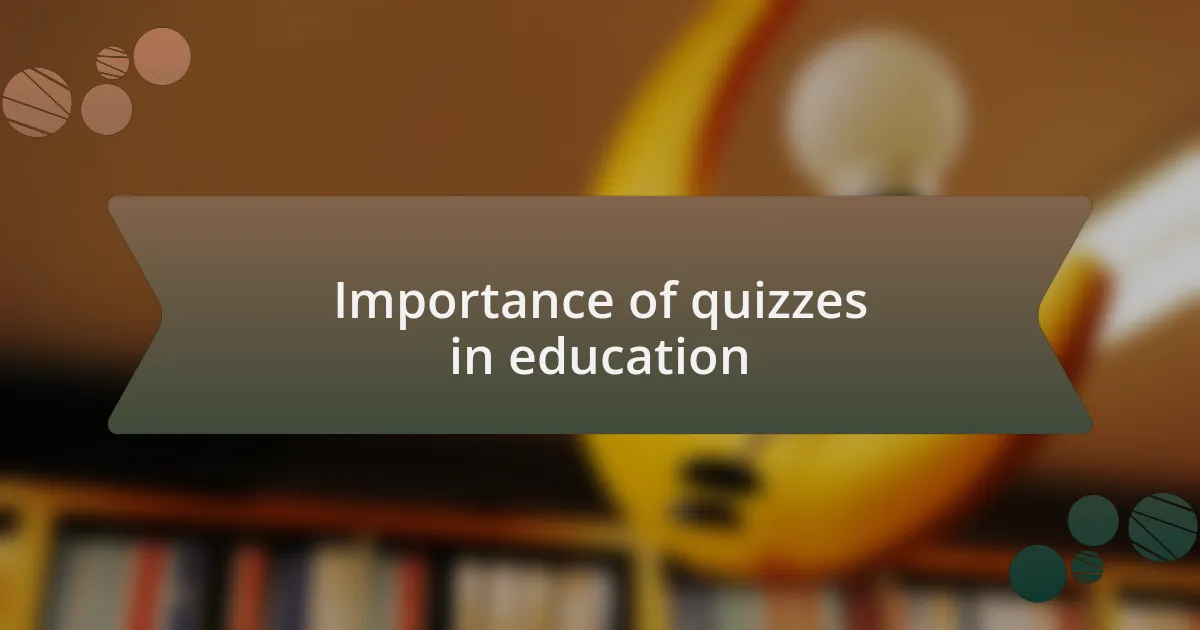
Importance of quizzes in education
Quizzes play a crucial role in the educational landscape, acting as a litmus test for students’ understanding. I remember one semester where I struggled with math concepts until we started using quizzes as a weekly routine. Suddenly, I found myself not just remembering formulas but actually understanding how to apply them—a shift that made all the difference.
Moreover, quizzes foster a sense of accountability and motivation. I noticed that when my peers and I knew there was a quiz coming up, we were much more inclined to review the material. It makes me wonder: what if every educational approach incorporated this kind of regular assessment? Wouldn’t it encourage a more engaged and proactive learning environment?
Additionally, they provide instant feedback, which is invaluable for both students and educators. Once, after taking a quiz, I received insights about my weak areas almost immediately, allowing me to focus my study efforts where they were needed most. This immediate feedback loop can significantly enhance the learning process, turning quizzes into powerful tools for growth.
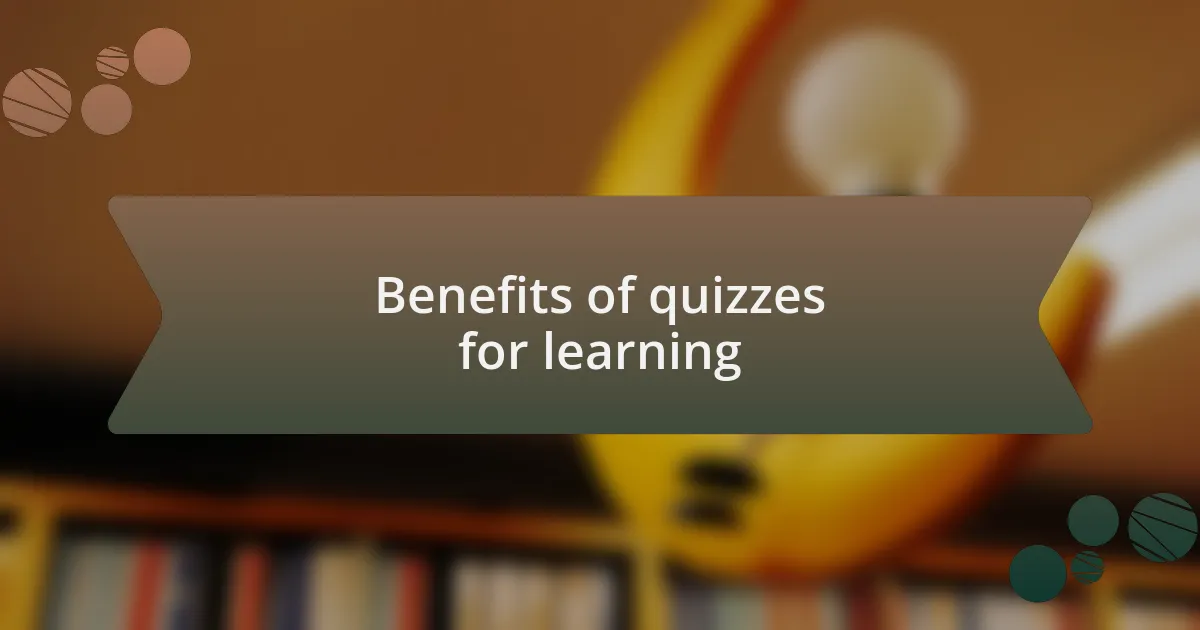
Benefits of quizzes for learning
Quizzes serve as fantastic tools for reinforcing knowledge. I vividly recall preparing for my science final; those little quizzes we took throughout the semester helped solidify concepts I initially found challenging. Have you ever noticed how reviewing material right before a quiz can put everything in perspective? It’s like the information gets rearranged in your brain, making it easier to recall later.
Another benefit I appreciate is how quizzes can identify gaps in understanding. There was a time when I thought I was doing well in history until a surprise quiz revealed my shaky grasp of key events. That experience taught me the importance of self-assessment; it drives me to explore topics more thoroughly. Don’t we all want to pin down exactly where our weaknesses lie so we can become stronger learners?
Lastly, quizzes encourage a collaborative learning atmosphere. I remember working with a study group where we created our own quizzes to challenge one another. This interaction not only made studying more enjoyable but also enriched our collective understanding. Isn’t it fascinating how teaching others can deepen your own knowledge? It’s truly remarkable how quizzes transform learning from a solitary activity into a community endeavor.
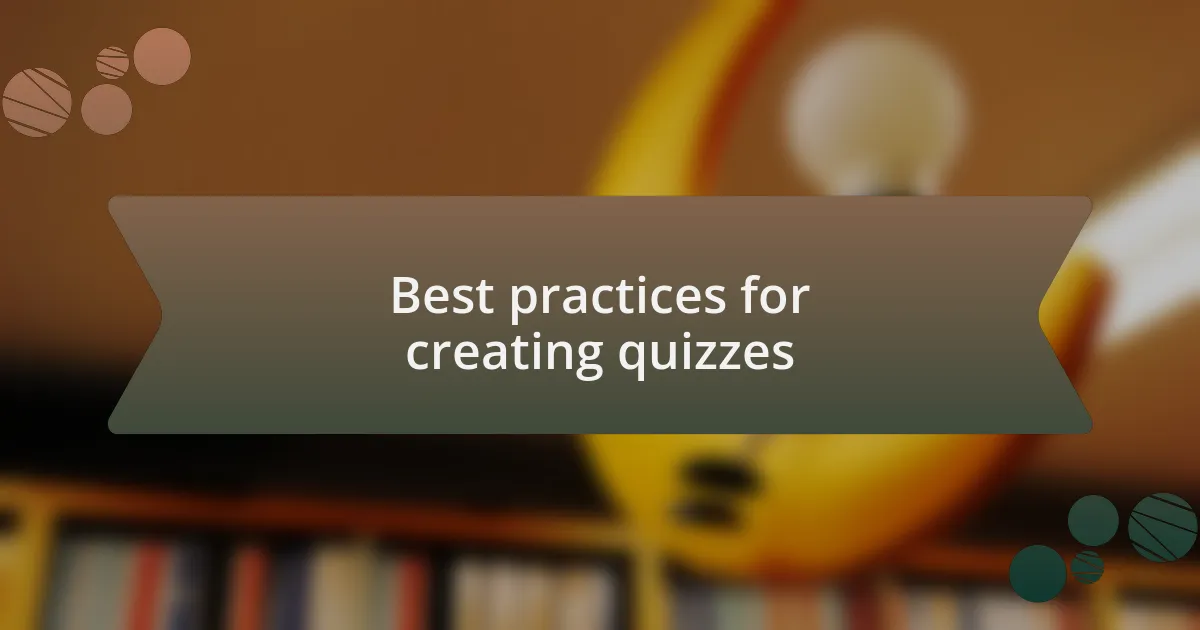
Best practices for creating quizzes
To create effective quizzes, it’s essential to align questions with clear learning objectives. When I developed a quiz for a literature class, I made sure each question tied directly to our key themes. Have you ever felt frustrated by quizzes that seemed out of touch with what you were actually learning? This alignment not only focused our study sessions but also sparked engaging discussions that made the material more relatable and memorable.
Another best practice I found invaluable is varying question types. During my time as a tutor, I mixed multiple-choice questions with short answers and even practical applications. This variety kept the quizzes dynamic and addressed different learning styles. Don’t you think that catering to different preferences can foster a more inclusive learning environment? When learners engage with content in various ways, they often discover new strengths.
Lastly, providing immediate feedback is crucial. I remember administering quizzes where I explained the reasoning behind each answer. This not only helped my peers grasp the concepts better but also strengthened my own understanding. Wouldn’t it be great if all quizzes could become moments of learning rather than just assessments? By offering constructive feedback, quizzes can transform into valuable learning experiences for everyone involved.
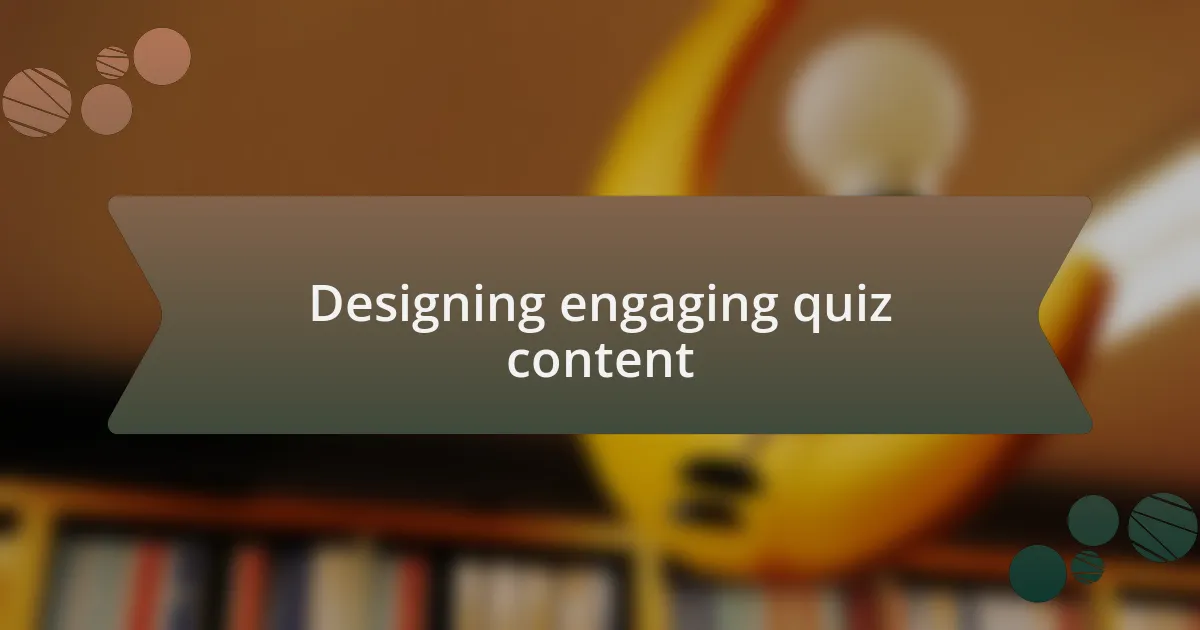
Designing engaging quiz content
When designing quiz content, I’ve found that incorporating real-life scenarios can make questions much more relatable. For example, in a recent quiz on environmental science, I used case studies of local environmental issues. This approach not only engaged my classmates but also connected our academic discussions to the world outside our classroom. How often have you heard students mention that they learn best when they can see the real-world applications of their studies?
Another aspect to consider is ensuring that the language used in the quiz resonates with the audience. During my experience creating quizzes for younger students, I learned the importance of avoiding jargon that might confuse them. Instead, I chose simple, straightforward language and context they could easily relate to. Isn’t it rewarding to see young learners light up when they understand a question fully, simply because it was written in a way that spoke to them?
Finally, I believe that incorporating a touch of creativity can turn a standard quiz into an engaging experience. The last quiz I designed had a theme that tied into our course material, using storytelling elements that invited students to solve mysteries rather than just answer questions. This made the assessment feel more like an adventure than a chore. Have you noticed a difference in motivation when quizzes are infused with creativity? I certainly have—students seemed more eager to participate and showcase their knowledge.
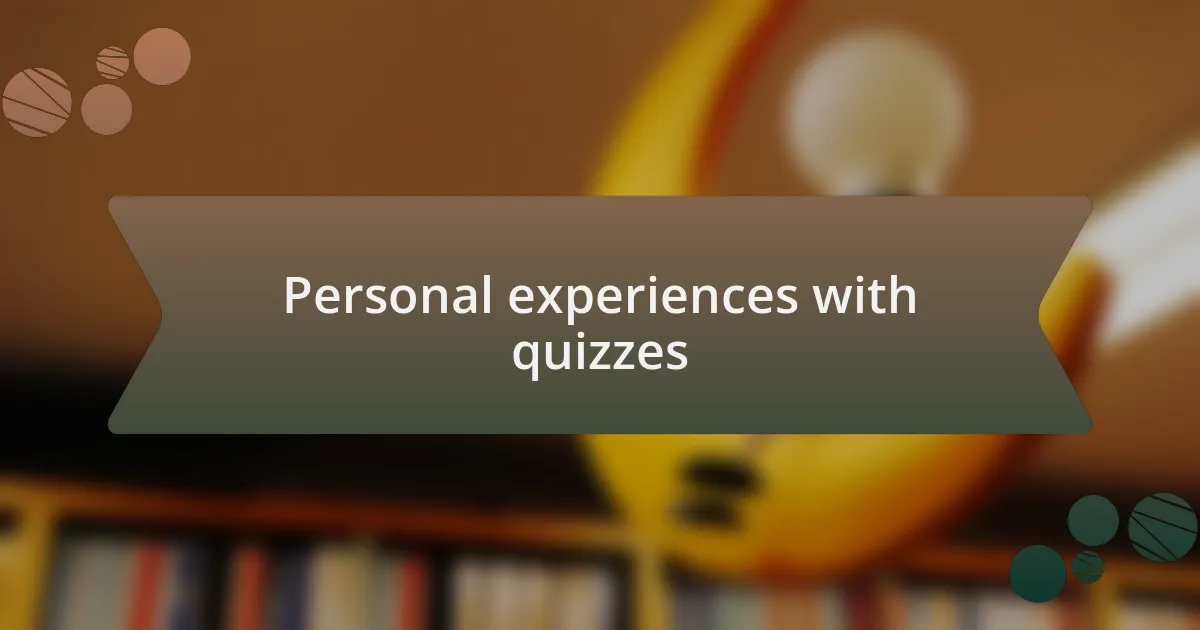
Personal experiences with quizzes
I remember the first time I took a quiz designed around interactive elements, and it was a game-changer. Instead of the usual multiple-choice format, we had to work in teams to solve a series of challenges that mimicked real-world scenarios. That collaborative approach not only made the quiz more enjoyable but also encouraged us to engage with each other’s ideas, fostering a deeper understanding of the material. Have you ever experienced that “aha” moment when a quiz feels more like teamwork than a test?
There was a time when I facilitated a quiz specifically tailored to gauge students’ prior knowledge before starting a unit. I was pleasantly surprised to see how it sparked lively discussions among students about topics they were curious about. It was incredible to witness them feel empowered to share their thoughts, reinforcing the idea that quizzes can be a powerful tool for learning rather than just a means to an end. Isn’t it fascinating how quizzes can pave the way for curiosity and collaboration?
Reflecting on my experiences, I’ve noticed that the emotional weight of quizzes significantly affects a student’s performance. In a particularly challenging course, a quiz I created encouraged students to reflect on their personal connection to the material. There was a palpable shift in the classroom atmosphere—a mix of nervousness and excitement—as they realized their insights mattered. Have you felt that unique blend of anxiety and anticipation when a quiz is framed as an opportunity to express oneself? It makes a world of difference in how we approach assessments.
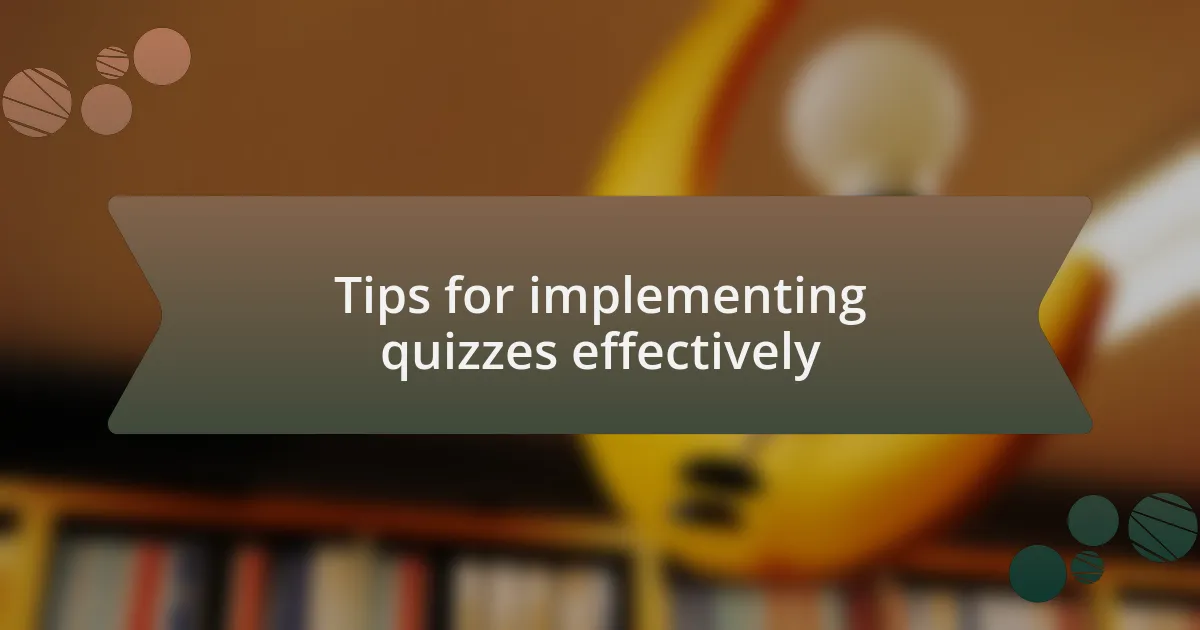
Tips for implementing quizzes effectively
When implementing quizzes, I’ve found that aligning them with clear learning objectives is crucial. I once created a quiz specifically aimed at reinforcing key vocabulary during a lesson. The results were enlightening; students were not only able to recall definitions but also apply them in context, proving that when quizzes target precise goals, they naturally enhance comprehension.
Another effective strategy I’ve tried is varying quiz formats to cater to different learning styles. For instance, during a science unit, I integrated visual elements like diagrams alongside traditional questions. This approach sparked excitement and allowed students who struggled with text-heavy questions to shine. Have you ever seen a shy student come alive because the quiz format played to their strengths? It’s moments like that that remind me how impactful thoughtful design can be.
Lastly, fostering a low-stakes environment when administering quizzes is something I prioritize. In one case, I emphasized that the quiz was just a tool for learning, not a grade-judging mechanism. The relief in the room was palpable; students were far more willing to take risks and explore their understanding openly. How often do we overlook the emotional component of assessments? By making quizzes feel like opportunities for growth rather than threats, we can encourage a more supportive learning atmosphere.